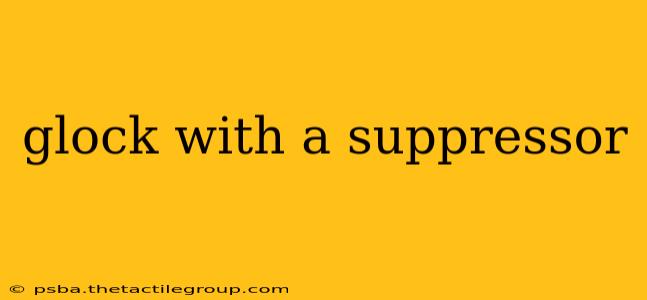The combination of a Glock pistol and a suppressor has become increasingly popular among both law enforcement and civilian shooters. This guide delves into the practical aspects, legal considerations, and performance implications of using a Glock with a suppressor.
Understanding the Appeal of Suppressed Glocks
The appeal is multifaceted. A suppressor, also known as a silencer (though it doesn't silence the firearm completely), significantly reduces the sound signature of a firearm. This leads to several key advantages:
-
Reduced Hearing Damage: This is arguably the most important benefit. Prolonged exposure to gunfire without hearing protection can lead to permanent hearing loss. A suppressor dramatically lowers the decibel level, protecting the shooter's hearing.
-
Improved Situational Awareness: In tactical situations, the reduced noise allows for better communication and awareness of surrounding sounds. The shooter can hear approaching threats more easily.
-
Reduced Recoil Perception: While not a primary function, some shooters report a slightly reduced perceived recoil with a suppressor, likely due to the added weight at the muzzle.
-
Increased Accuracy: The added weight can also contribute to slightly improved accuracy, particularly for rapid-fire situations.
Choosing the Right Suppressor for Your Glock
Selecting the appropriate suppressor requires careful consideration of several factors:
-
Caliber: Ensure the suppressor is compatible with your Glock's caliber (.380 ACP, 9mm, .40 S&W, .45 ACP, 10mm, etc.). Different calibers require suppressors with varying internal designs.
-
Mounting System: Suppressors utilize various mounting systems, including direct-thread mounts, piston systems, and quick-detach mechanisms. Choose a system compatible with your Glock's barrel threading or requires the use of an adapter. Many aftermarket barrels are available for Glocks that are threaded for suppressor use.
-
Materials and Construction: Suppressors are typically constructed from materials like stainless steel, titanium, or aluminum. Each material offers different levels of durability, weight, and cost.
-
Size and Weight: Larger and heavier suppressors tend to be more effective at sound reduction but can impact the handgun's balance and concealability.
Legal Considerations of Suppressor Ownership
The legal landscape surrounding suppressor ownership varies significantly by jurisdiction. It is crucial to thoroughly research and understand the federal, state, and local laws regarding suppressor possession and use before purchasing one. This typically involves a background check and registration process. Ignoring these legal requirements can result in severe penalties.
Performance Implications of Using a Suppressor
While suppressors offer significant advantages, they can also impact performance in certain aspects:
-
Increased Barrel Length: Adding a suppressor effectively increases the barrel length, which can slightly affect the accuracy and point of impact.
-
Increased Weight: The added weight can alter the balance of the pistol, affecting handling and maneuverability.
-
Potential for Increased Back Pressure: Some suppressors can create higher back pressure, leading to increased felt recoil or potential malfunction.
-
Potential for Increased Cleaning Needs: Suppressors require regular cleaning and maintenance to ensure optimal performance.
Conclusion
Using a Glock with a suppressor offers considerable benefits, primarily in terms of hearing protection and tactical advantages. However, careful consideration of legal requirements, suppressor compatibility, and performance implications is essential for safe and effective use. Remember to always prioritize safe gun handling practices and consult with relevant experts to make informed decisions. This information is for educational purposes only and does not constitute legal or professional advice. Always consult with local and federal authorities regarding firearm and suppressor laws.

